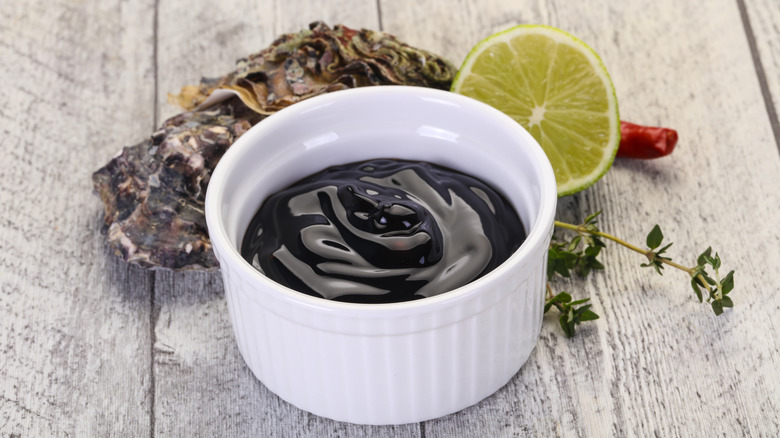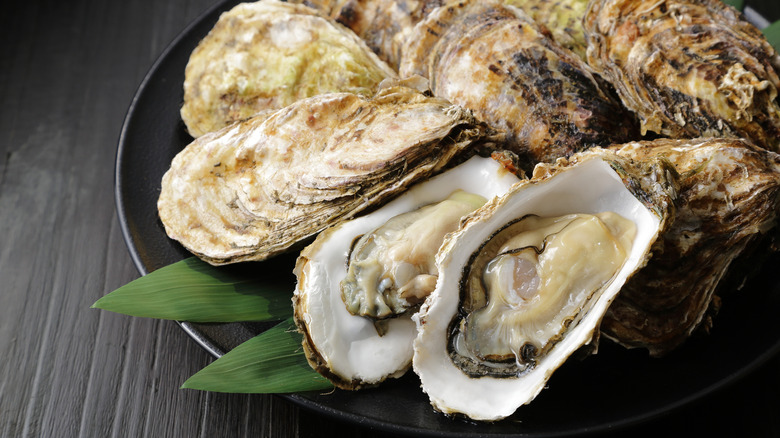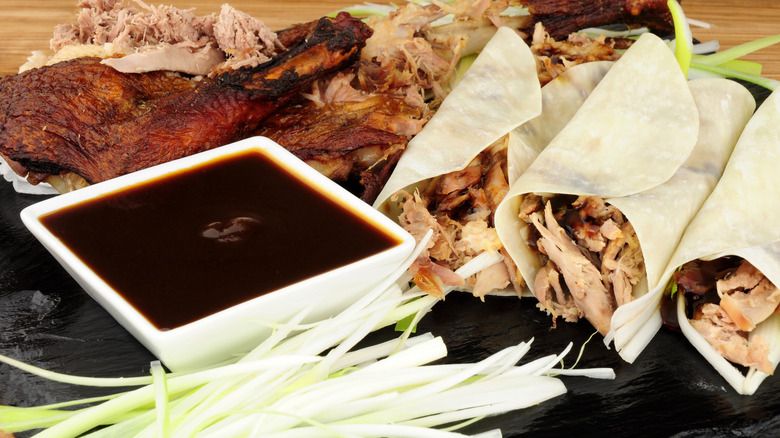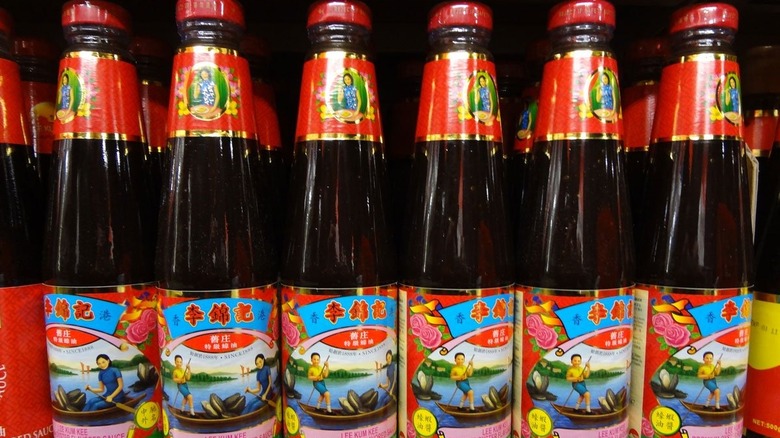What Is Oyster Sauce And How Do You Use It?
If you've never heard of oyster sauce, brace yourself: Your stir-fry game is about to get a serious upgrade. But first things first: What is oyster sauce? It's what happens when you cook oysters in water for a period of time and then take those caramelized juices and mix them with some sugar, salt, and soy sauce that has been thickened with cornstarch. The result is a dark, flavorful sauce with a dense, syrup-like consistency that is sweet and salty (though not fishy), and full of rich, umami flavor, making it an ideal condiment to keep stocked in your pantry to add depth to any number of dishes.
Today it's a popular ingredient in Cantonese, Thai, and Vietnamese cooking, and can be easily found at most grocery stores as well as Asian food stores. However, despite its ubiquity today, oyster sauce was a relatively recent invention, and one we only know about by accident.
How was oyster sauce invented?
Some condiments are so old we don't know for sure how or when they were first made. Soy sauce, for instance, is thought to have been introduced to Japanese cuisine some time between 250-710 CE, according to Kikkoman. By comparison, oyster sauce is a very recent invention.
Back in 1888, the proprietor of a food stall in the Guangdong province of China accidentally forgot about a pot of oyster soup he'd left simmering on the stove. When he returned several hours later, he was greeted with a thick brown paste instead of the clear oyster soup he's intended to make, according to Great British Chefs. Not wanting to waste the oysters, Lee Kum Sheung decided to taste the concoction rather than simply dumping it out, and found it intensely flavorful, with notes of caramelized sweetness and umami. He sold the sauce to customers as a seasoning for rice, and it was an instant hit, inspiring Sheung to create a new business called Lee Kum Kee to sell his discovery all over China. The company still exists today, and sells over 200 condiments all over the world, including oyster sauce made from Sheung's original recipe.
Oyster sauce vs hoisin sauce
Oyster sauce isn't the only thick, brown Cantonese condiment often found in stir-fry recipes. Hoisin sauce also fits this description, although the two sauces are actually quite distinct once you get past appearances.
Unlike oyster sauce, which is made from oyster extract, sugar, and salt, hoisin sauce is vegan-friendly, made from fermented soybeans, garlic, five-spice powder, chiles, and sugar. The chiles and spices give hoisin sauce an added kick that's completely absent in oyster sauce, but that's not the only difference.
While both sauces can be used to add a depth of salty, umami, and sweet flavors to a dish, their flavor profiles are still distinct. Hoisin sauce is sweeter and less salty than oyster sauce and usually thicker in consistency, with some even calling it "Chinese barbecue sauce." It's often brushed onto duck or spare ribs before cooking, used to seasoning lettuce cups and moo shu pork, and even served on its own as a dipping sauce.
Oyster sauce, on the other hand, has a stronger, saltier flavor with more subtle notes of caramelized sweetness. It's typically used more conservatively than hoisin sauce for this reason, or mixed with other ingredients like mirin, rice vinegar, soy sauce, or even brown sugar to avoid overpowering the dish.
How to cook with oyster sauce
The most popular use for oyster sauce is doubtlessly in stir-fry sauce. Cooking show host and author Martin Yan recommends mixing a few tablespoons of the potent condiment with some chicken stock, soy sauce, rice wine, sesame oil, sugar, white pepper, and cornstarch to create the perfect, savory base for your next stir-fry, and as an added bonus the sauce will keep in the fridge for up to a few days.
However, once you start cooking with oyster sauce, you're sure to find yourself reaching for it all the time, and not just for vegetables, tofu, and noodles. In fact, Bon Appétit's Amber Lee heartily recommends adding oyster sauce to your spaghetti. According to Lee, the combination of garlic, butter, crushed red pepper flakes, and parmesan cheese is "super savory" and "lip-smacking," as strange as it may sound.
If you still can't get enough of the sauce, adding some to your seafood, barbecue, and bitter green vegetables will be sure have guests asking for your recipes.
Where to buy oyster sauce
Unlike certain specialty ingredients, you don't need to schlep all the way to the Asian market to find oyster sauce. If it's not in the condiment aisle of your local grocery store, chances are it will be in the international food aisle. Of course, if you want to save some money, oyster sauce (as well as other staple condiments like hoisin sauce and fish sauce) can be found for much cheaper at your local Asian market, and they might just taste better as well.
However, while shopping, there is one thing to be wary of: the wording on the bottle. If it says "oyster-flavored sauce," don't fret; it's not a cheap imitation, just another name for oyster sauce. Meanwhile, "cooked oyster sauce," is not the same thing. While it does contain oyster sauce, cooked oyster sauce is diluted with ingredients like chicken broth, soy sauce, and sake, and thus won't give you the same texture or intensity of flavor as oyster-flavored sauce will.
Nutritional information about oyster sauce
Oyster sauce packs a serious punch of flavor, but it doesn't come free, nutritionally speaking. For example, one tablespoon of Kikkoman's oyster sauce contains four grams of sugars and a whopping 730mg of sodium (via Fitbit). That's about 30% of your recommended daily intake in just one tablespoon, according to the FDA.
While oyster sauce is relatively low in calories (about 20 per tablespoon), carbs, and fat, it equally doesn't offer much in terms of nutrients. The sauce has minimal protein, and no real vitamins or minerals to speak of, unlike raw oysters, which are chock-full of nutrients including vitamin D, vitamin B12, iron, zinc, copper, and selenium (via Healthline).
Of course, as long as you're not overdoing the sodium, and ensure whatever you're seasoning has the breakdown of micro and macronutrients you need, adding a little oyster sauce to your food shouldn't impact your health in any substantial way.





